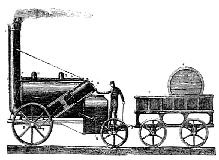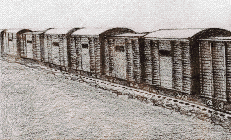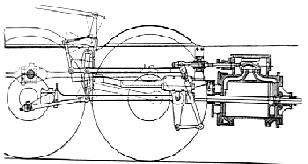 |
Vol 1, No 2, 5 July 1999
|
|
|
 S H O R T S T O R Y:
S H O R T S T O R Y:
Last Train to Clarksville Cyril Simsa Eleven... Twelve... Midnight... Mikhail counted the strokes of the old station-house clock tower, that had somehow miraculously escaped the shooting earlier. Lord have mercy, still only midnight? That meant there were still six hours to go till he would be relieved from the night watch. Another six hours to go before the first light of dawn came to relieve him from the intolerable gloom of his duties. Merde. How did he get into this mess? Another faceless station, another pointless night with nothing but the corpses of the station master's dogs and chickens to keep him company, and the smell of his comrades' slop-buckets heavy on the wind.
Mikhail leaned back against the rusted wall of the cattle-car, the coarse cloth of his collar scratching his neck, and reached into his pocket to hunt for a cigarette. A useless station, this. Nothing but bad vodka and dead farm animals and dry black bread. No tobacco. No cheese or vegetables. No brothel. Just rusty points, empty coal-bins, and a huge, blank sky, full of alarming stars that twinkled so hard they hurt his eyes. For himself, he would have given almost anything for a little fresh food - perhaps even his immortal soul, perhaps even only a pickled horseradish - but he knew he must never admit this. His comrades had other ideas of a good time. In the distance he could hear men's voices laughing and singing and drinking. Later on, he knew, they would switch to an uneasy mixture of shouting and squealing, as they fought and fucked each other in the darkened corners of the cattle-cars, striving finally to achieve, however briefly, oblivion. But for now a forced merriness was still the order of the day. Nearer at hand, he could hear the clink of tools on metal - that would be someone who preferred building bombs to sex and fisticuffs and alcohol. And then, across the rails from where he stood, something large and unrecognisable was making a dreadful racket shaking the coarse bushes that covered the bank of the siding. An animal? A frightened peasant, thinking to demonstrate his stealth, as he tried to make sense of the catastrophe that had afflicted his village? Perhaps in the end only a ghost. Mikhail no longer had it in him to wonder or even to care.
Tonight the weather was warm and mild, with neither the threat of excessive rain nor the blistering cold of the vast Siberian winter. On nights like this, the journey could sometimes even seem comforting. There was a sense of belonging in its crude banality - a sense of purpose in its dull companionship, a sense of solidarity in its shared lack of purpose. But Mikhail had also seen nights when frost traced thick, swirling patterns on the doors of the cattle-cars, and nights when the rain poured so hard, all one could see was veils of mist and puddles of dirty water in the gaps between the sleepers. And then there were nights when the moon was dark, and clouds blew grey and spectral across the sky, like the funeral barque of his companions' hopes and dreams, and even Mikhail hid in the undergrowth so as to stay alive until morning. Mikhail no longer remembered why they travelled armed: it was just one of the mysteries that shrouded the beginning of their unfathomable journey. All he knew was that they had always travelled armed - a legion of exiles on the track to who knew what unimaginable destination. An international diaspora. An army that knew full well, even as it embarked onto its train each morning, it could never, ever hope to arrive. Their estrangement was their strength. Because, Mikhail knew, they, and only they, could ever truly understand each other and their terrifying foibles. Only they knew the smells and the sounds and the sense of loss that gave form and flavour to the blank of their lives. Only they knew the emptiness that structured their days and nights, the nightmares of their never-ending journey. Eternal wanderers, they were unwitting partners in the company of exiles. So much for philosophy, he scratched at a pimple on the back of his neck. Six hours to go. Merde. Well, five and half by now, perhaps. It was almost enough to make a man start shooting ghosts in the quivering undergrowth. Time to go see a man about a piece of horseradish... Pausing only to make sure his bayonet was strapped firmly to the tip of his rifle, he slipped out from the back of the rusted cattle-car into the puddle of darkness that spread out like an ethereal bloodstain from the scrub on the far side of the siding. His heavy black boots crunched as he stepped off the sleepers, the bushes shook. Somewhere at the back of station master's house a screech-owl cried, and his friends howled in ecstasy. The owl shrieked a second time, and then suddenly Mikhail saw its ponderous white wings flapping by overhead like a little feathered moon. Brackish drops of tepid, red moisture spattered down on his upturned face. Had he been seeing things, or was that a human hand it had been carrying in its beak? The bushes ahead of him had fallen still again. Mikhail paused to unbutton his fly and sidled up to the black and red shadows, before reaching inside to relieve himself. Ah, yes, there was nothing quite as satisfying to a man as his biology. Good hunting tonight. Cyril Simsa is a translator and writer with a special interest in the literature of the fantastic. His translations, stories and essays have appeared in a wide variety of publications, including Allskin, Back Brain Recluse, Foundation, Science-Fiction Studies, and The Encyclopedia of Fantasy. In his day job he works at Charles University in Prague.
|
|
![]()
Copyright (c) 1999 - Central Europe Review Internet servis, a.s.
All Rights Reserved
 How many months was it now that they had been riding the rails North and East and South and West? How many months had they spent riding in circles in a bolted cattle-wagon, emerging out of the stench and the darkness and the endless barracking only at dusk so as to rob and terrorise the locals - and then, come dawn, to drive away stony-faced as if nothing had happened? He could no longer remember. It seemed like eternity. And in his darker moments, when he was insufficiently drunk, or when they had not found a large enough community of peasants to rob, he wondered if perhaps it might not really be Eternity - a special aspect of Eternity reserved for soldiers and murderers and outcasts like his comrades. Judging from this miserable station, he suspected that all of them must have been very wicked once, either in this life or a previous one. And all of them, he felt certain, were heading for reincarnation as a slug or a mad virologist's experimental monkey. Karma, as his Buddhist colleagues would say, before he killed them.
How many months was it now that they had been riding the rails North and East and South and West? How many months had they spent riding in circles in a bolted cattle-wagon, emerging out of the stench and the darkness and the endless barracking only at dusk so as to rob and terrorise the locals - and then, come dawn, to drive away stony-faced as if nothing had happened? He could no longer remember. It seemed like eternity. And in his darker moments, when he was insufficiently drunk, or when they had not found a large enough community of peasants to rob, he wondered if perhaps it might not really be Eternity - a special aspect of Eternity reserved for soldiers and murderers and outcasts like his comrades. Judging from this miserable station, he suspected that all of them must have been very wicked once, either in this life or a previous one. And all of them, he felt certain, were heading for reincarnation as a slug or a mad virologist's experimental monkey. Karma, as his Buddhist colleagues would say, before he killed them. As time went on, he was finding it increasingly difficult to remember how he had ever come to join the convoy, or where they had told him they were going to get him on board. Indeed, he found it almost impossible to remember anything of his earlier life - anything except the journey itself, the endless stops on the endless railway line, the endless days in the stifling cattle-cars - always the same except for minor variations. A different pattern of points and railway yards... A different curve to the roof of the station buildings... Changes in climate, vegetation, and the intensity of the night...
As time went on, he was finding it increasingly difficult to remember how he had ever come to join the convoy, or where they had told him they were going to get him on board. Indeed, he found it almost impossible to remember anything of his earlier life - anything except the journey itself, the endless stops on the endless railway line, the endless days in the stifling cattle-cars - always the same except for minor variations. A different pattern of points and railway yards... A different curve to the roof of the station buildings... Changes in climate, vegetation, and the intensity of the night...